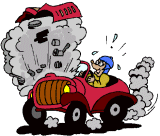
Cars
 One of the largest sources of air pollution in Britain is transport. The number of vehicles on Britains roads is constantly increasing and pollution from them is now a major problem. Today there are about 29 million vehicles on the road in Britain, 24 million of which are cars.
One of the largest sources of air pollution in Britain is transport. The number of vehicles on Britains roads is constantly increasing and pollution from them is now a major problem. Today there are about 29 million vehicles on the road in Britain, 24 million of which are cars.
The majority of Britain's vehicles run on petrol or diesel. Unleaded petrol is now commonly available, and all cars made today can run on this. Lead pollution can be particularly harmful to children, and can be damaging to wildlife. Nevertheless, cars using unleaded petrol still emit other pollutants. These include carbon monoxide, nitrogen oxides and particulates. They are all emitted from car exhausts and create pollution close to the ground, where it contaminates the air we breathe, leading to health problems. All new cars sold in Britain from January 1993 have had catalytic converters. This reduces carbon monoxide and nitrogen oxides pollution.
Ozone is another major pollutant, but it does not come out of exhaust pipes. It is formed when other air pollutants mix and react together in sunlight to form smog. This is a different type of smog to that formed in earlier years from a combination of smoke and fog.
Websites
Other topics Technical Page
Technical Page
Schools Database
US EPA
Introduction
Cars
Doing Our Bit
Human Health
Impacts
Indoors
Industry & Power
London Smog
Outdoors
Pollutants
Smog
Wildlife
 Print Topic
Print Topic